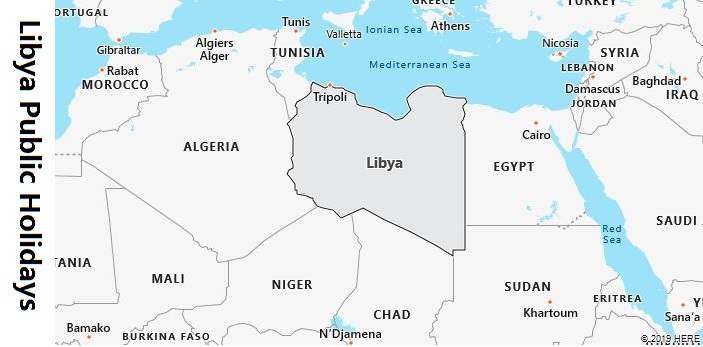Libya Holidays
Libya Public Holidays
Searching for the national holidays in Libya? All public holidays in Libya are treated like Sundays. This means that most of the Libya employees have a day off and all schools are closed on these office holidays. If you are planning a trip to Libya and want to know what the national and regional holidays are, check the details in the tables below.
List of Official Holidays in Libya for Year 2020
| # | Date | Holiday | Day |
| 1 | February 17, 2020 | February 17th Revolution | Monday |
| 2 | May 01, 2020 | Labour Day | Friday |
| 3 | May 24, 2020 | Eid al-Fitr | Sunday |
| 4 | May 25, 2020 | Eid al-Fitr Holiday | Monday |
| 5 | July 30, 2020 | Arafat Day | Thursday |
| 6 | July 31, 2020 | Eid Al-Adha | Friday |
| 7 | August 01, 2020 | Eid Al-Adha Holiday | Saturday |
| 8 | August 02, 2020 | Eid Al-Adha Holiday | Sunday |
| 9 | August 20, 2020 | Hijri New Year | Thursday |
| 10 | September 16, 2020 | Martyrs’ Day | Wednesday |
| 11 | October 23, 2020 | Liberation Day | Friday |
| 12 | October 29, 2020 | Birthday of Prophet Muhammed | Thursday |
| 13 | December 24, 2020 | Independence Day | Thursday |
List of Official Holidays in Libya for Year 2021
| # | Date | Holiday | Day |
| 1 | February 17, 2021 | February 17th Revolution | Wednesday |
| 2 | May 01, 2021 | Labour Day | Saturday |
| 3 | May 13, 2021 | Eid al-Fitr | Thursday |
| 4 | May 14, 2021 | Eid al-Fitr Holiday | Friday |
| 5 | July 19, 2021 | Arafat Day | Monday |
| 6 | July 20, 2021 | Eid Al-Adha | Tuesday |
| 7 | July 21, 2021 | Eid Al-Adha Holiday | Wednesday |
| 8 | July 22, 2021 | Eid Al-Adha Holiday | Thursday |
| 9 | August 10, 2021 | Hijri New Year | Tuesday |
| 10 | September 16, 2021 | Martyrs’ Day | Thursday |
| 11 | October 19, 2021 | Birthday of Prophet Muhammed | Tuesday |
| 12 | October 23, 2021 | Liberation Day | Saturday |
| 13 | December 24, 2021 | Independence Day | Friday |















































